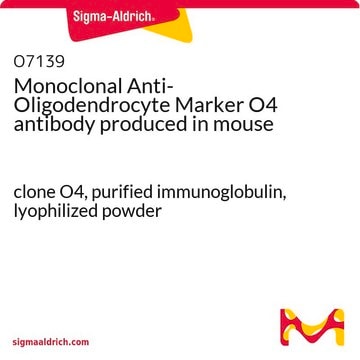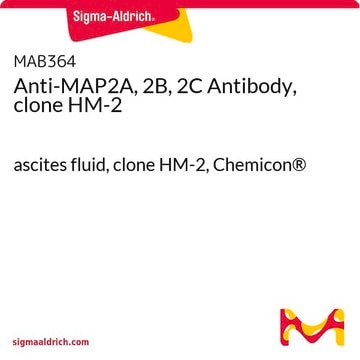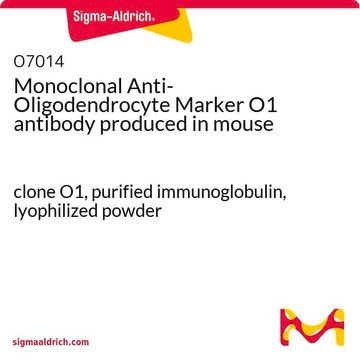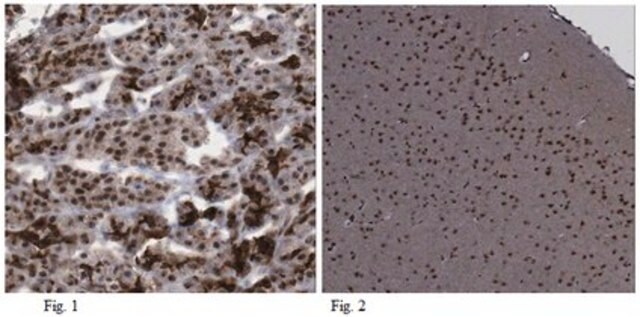MAB344
Anti-O1 Antibody, clone 59
clone 59, Chemicon®, from mouse
Se connecterpour consulter vos tarifs contractuels et ceux de votre entreprise/organisme
About This Item
Code UNSPSC :
12352203
eCl@ss :
32160702
Nomenclature NACRES :
NA.41
Produits recommandés
Source biologique
mouse
Niveau de qualité
Forme d'anticorps
saturated ammonium sulfate (SAS) precipitated
Clone
59, monoclonal
Espèces réactives
chicken, rat, mouse, human
Fabricant/nom de marque
Chemicon®
Technique(s)
immunohistochemistry: suitable
Isotype
IgM
Conditions d'expédition
wet ice
Modification post-traductionnelle de la cible
unmodified
Spécificité
Recognizes Oligodendrocyte marker O1. Also reacts with certain galactolipids in sperm (see Additional Information library for list).
Immunogène
White matter of corpus callosum from rat brain.
Application
Anti-O1 Antibody, clone 59 is an antibody against O1 for use in IH.
Immunohistochemistry: 10-20 μg/mL on unfixed, shock frozen tissue.
Note: 01 is a lipid which is released from the membrane by alcohol.
Optimal working dilutions must be determined by the end user.
Note: 01 is a lipid which is released from the membrane by alcohol.
Optimal working dilutions must be determined by the end user.
Research Category
Neuroscience
Neuroscience
Research Sub Category
Neuronal & Glial Markers
Neuronal & Glial Markers
Forme physique
Format: Purified
Liquid. Buffer = 0.05 M Potassium Phosphate, 0.3 M NaCl, pH 8.0 with 0.05% sodium azide.
Stockage et stabilité
Maintain lyophilized material at +2–8°C for up to 12 months. After reconstitution maintain frozen at -20°C in undiluted aliquots for up to 6 months. Avoid repeated freeze/thaw cycles.
Remarque sur l'analyse
Control
Oligodendrocyte culture, Brain
Oligodendrocyte culture, Brain
Autres remarques
Concentration: Please refer to the Certificate of Analysis for the lot-specific concentration.
Informations légales
CHEMICON is a registered trademark of Merck KGaA, Darmstadt, Germany
Clause de non-responsabilité
Unless otherwise stated in our catalog or other company documentation accompanying the product(s), our products are intended for research use only and are not to be used for any other purpose, which includes but is not limited to, unauthorized commercial uses, in vitro diagnostic uses, ex vivo or in vivo therapeutic uses or any type of consumption or application to humans or animals.
Code de la classe de stockage
10 - Combustible liquids
Classe de danger pour l'eau (WGK)
WGK 2
Point d'éclair (°F)
Not applicable
Point d'éclair (°C)
Not applicable
Certificats d'analyse (COA)
Recherchez un Certificats d'analyse (COA) en saisissant le numéro de lot du produit. Les numéros de lot figurent sur l'étiquette du produit après les mots "Lot" ou "Batch".
Déjà en possession de ce produit ?
Retrouvez la documentation relative aux produits que vous avez récemment achetés dans la Bibliothèque de documents.
Jong-Wan Kim et al.
Folia neuropathologica, 57(1), 24-35 (2019-05-01)
This study was performed to determine whether the disturbed maturation of oligodendrocyte (OL) progenitors might be related to lipopolysaccharide (LPS)-induced hypomyelination. We created organotypic cultures of forebrain slices from neonatal rats and explored the morphological changes of glial cells expressing
Generation of functional neurons and glia from multipotent adult mouse germ-line stem cells.
Streckfuss-Bomeke, Katrin, et al.
Stem Cell Research, 2, 139-154 (2009)
Chao Jiang et al.
Molecular neurobiology (2016-01-10)
Studies have shown that progesterone enhances functional recovery after ischemic stroke, but the underlying mechanisms are not completely understood. Therefore, we investigated the effect of progesterone on vascular endothelial growth factor (VEGF), brain-derived neurotrophic factor (BDNF), and neurogenesis in a
Immuno-electron-microscopic identification of O-antigen-bearing oligodendroglial cells in vitro
Berg, G and Schachner, M
Cell and Tissue Research, 219, 313-325 (1981)
Olfactory ensheathing cells exhibit unique migratory, phagocytic, and myelinating properties in the X-irradiated spinal cord not shared by Schwann cells.
Karen L Lankford,Masanori Sasaki,Christine Radtke,Jeffery D Kocsis
Glia null
Notre équipe de scientifiques dispose d'une expérience dans tous les secteurs de la recherche, notamment en sciences de la vie, science des matériaux, synthèse chimique, chromatographie, analyse et dans de nombreux autres domaines..
Contacter notre Service technique








